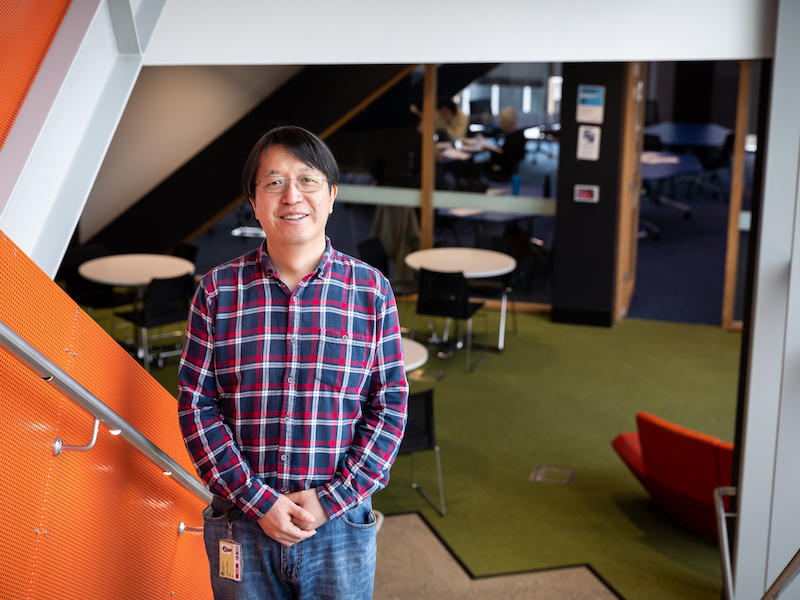Researcher Highlights
A new frontier in space law and justice technology
Bin Li
Dr Bin Li’s work lies at the intersection of technology, law and justice. His research assesses the legal regulation of space technologies and explores the benefits and risks that new technologies pose for justice reform.

What role does technology have in the justice sector? How should space technologies be regulated by national and international governments? As we enter a new decade of technological innovation, Newcastle Law School lecturer Dr Bin Li is helping to determine the best ways to use and regulate some of our world’s most innovative creations.
“Technology has been rolled out rapidly in the justice sector in Australia and other parts of the world, and it is important to ensure that the use of technology contributes to fair and just resolution of disputes instead of causing new burden or adverse impact on disputing parties,” explains Bin.
“My research aims to safeguard ‘fairness’ while the justice sector embraces various technological innovations.”
Regulating space technologies
After his PhD studies at Renmin University of China, Bin launched his career at Beijing University of Aeronautics and Astronautics (now Beihang University), China’s leading aerospace technology and engineering university. As a new staff member, Bin began exploring how domestic and international legal rules regulate the use of space technology.
“My research looks into how national governments should harness the use of space technology — in military activities in outer space for example — so that the application of the technology can contribute to a safe and secure outer space environment for humankind.”
Bin has now been researching space technology regulations for more than 13 years. He has emerged as a prominent and authoritative voice within the research community and general public, having written several popular articles for publications such as The Conversation.
“My research work and articles are helping to inform the general public about important issues arising from human use of outer space and space technology.
“It’s exciting to see the increasing hits on my publications at different online platforms, including SSRN, ResearchGate and The Conversation.”
One of Bin’s recent articles for The Conversation,evaluating India’s anti-satellite test, garnered more than 25,000 hits from all corners of the globe.
“I’m proud that my research is having a high impact on the public perception of outer space—the new frontier for humankind.
“These metrics means that people are spending their time reading my research, and that it has value to them. This also means potential collaboration opportunities with researchers at home and abroad.”
Reforming the justice system
After moving to Australia in 2016, Bin began to extend his research on technology into a new domain: the justice system. His work in this area seeks to shed greater light on how new technologies, such as artificial intelligence and blockchain, are used within the justice sector and how they impact on dispute resolution processes.
“We know there are some concerns around the use of these technologies in the justice sector.
“My research investigates how technological innovations are used in court processes and other dispute resolution approaches, such as mediation and arbitration, and how they affect stakeholders’ rights and obligations.
“Ultimately, we are looking at whether the use of these new technologies really contributes positively to fairness and justice.”
Within this research domain, Bin has been collaborating with colleagues at the University of Newcastle, including Professor Tania Sourdin, on a research project evaluating ‘Adieu’, an online divorce tool developed byAdieu AI Pty Ltd.
“We are collecting and analysing feedback of the platform’s end-users to see what concerns stakeholders have with the online technology and what could be done to address these challenges.”
Forging local and international partnerships
Bin’s research network extends to Canada, China, the USA and elsewhere. He is a visiting scholar for universities such as DePaul University College of Law, USA, where he has conducted research into air and space law.
Bin’s educational background and work experience in highly respected Chinese universities also puts him in an excellent position to engage and collaborate with top Chinese researchers specialised in areas of law and technology and space law.
While Bin shares that the move from China to Australia in 2016 was initially challenging, he continues to be inspired and motivated by his peers at the University of Newcastle and further afield.
“The transition from the work environment in China to Australian academia was a bit hard at first, but thanks to the generous support from colleagues at the Newcastle Law School and the Faculty of Business and Law, I am used to this new and exciting work setting and really enjoy it!”
The University of Newcastle acknowledges the traditional custodians of the lands within our footprint areas: Awabakal, Darkinjung, Biripai, Worimi, Wonnarua, and Eora Nations. We also pay respect to the wisdom of our Elders past and present.